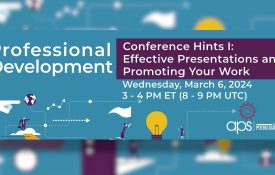-

Conversation Research Still Requires a Human Ear
Conversations, whether in the form of small talk or a heated debate, involve a nuanced and unique exchange of words and behaviors. Recent technological advances have made it easier for conversation researchers to manage this complexity, paving the way for a deeper understanding of how humans communicate.
-

Professional Development Workshop: Sharing Your Work Through Effective Presentations
In a March 2024 Professional Development workshop, two experts shared tips and tricks for creating effective presentations, as well as insights into promoting scientific work. A recording of the webinar is available to view for APS members and workshop registrants.
-
Twins Are a Mirror to Each Other – And a Window Into the Mysteries of Genetics
In the ongoing debate over nature versus nature, twin studies have given a glimpse into the role of genes in behavior and decisions. Psychologist Nancy Segal shares stories of twins raised apart. ...
-
How Are You, Really?
We know we should get a physical exam every year; we have annual reviews at work; some couples even do periodic relationship audits. And yet many of us don’t regularly check in with our emotional health — though it is arguably the most important contributor to overall well-being. The New York Times talked to experts in clinical psychology, positive psychology, flourishing, thriving, resilience and burnout about what contributes to a sense of well-being and how to evaluate it. Then we came up with a series of questions adapted from these conversations, as well as from prompts in four common psychological assessments. ...
-

What Comes Next? The Joy of Anticipating Melodies
Podcast: In this episode of Under the Cortex, APS’s Özge Gürcanlı Fischer Baum hosts music researchers who delve into the rewarding experience of accurately predicting tunes.
-
How to Actually Catch a Liar, According to the New Science of Lie Detection
We naturally detect lies all the time. It could be a dip in our partner’s voice alerting us to the fact that they’re concealing their emotions; a child’s eyes drifting back to the drawer containing a present they weren’t supposed to open; or an implausible story told by a colleague trying to explain why the company’s petty cash has gone missing. Yet we also often fail to detect lies. Why? Researchers have been trying to answer this question for over a century and the liars are still slipping through our fingers. But the latest research may help shine a light on where we’ve been going wrong.

